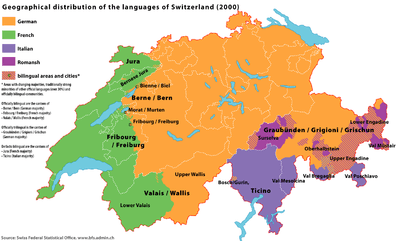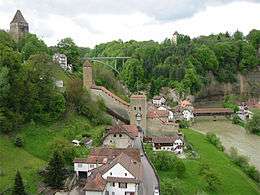Röstigraben

Röstigraben (German pronunciation: [ˈrøːstiˌɡraːbən], literally "Rösti ditch", also transcribed Röschtigraben in order to reflect the Swiss German pronunciation [ˈrøːʃtiˌɡrabə]) is a humorous term used to refer to the cultural boundary between German-speaking and French-speaking parts of Switzerland. There is also a term Polentagraben which refers to the Italian-speaking canton of Ticino.
The term first appeared during World War I, when the neutral Switzerland stood between the belligerent powers of the German Empire and the French Third Republic, though it did nоt become popular until the late 1970s in the course of the Jurassic separatism movement resulting in the establishment of the Canton of Jura.
Etymology
The first part of the term is derived from the Swiss German name for hashed potatoes, rösti, which originated in the Canton of Bern and is considered typical of Swiss German cuisine.[1]
"Graben" has both the concrete and abstract meaning of rift, with the Saane/Sarine river valley in the bilingual Canton of Fribourg separating the linguistic areas. The Swiss-French use a similar expression: barrière de Rös(ch)ti, literally "Rösti barrier" or Rideau de rös(ch)ti ("Rösti curtain", similar to the Iron Curtain). Just like Röstigraben it has become a familiar facetious expression used whenever differences arise, e.g. the different voting results.
Definition

Geographically the line stretches from the Jura Mountains (Canton of Jura and Bernese Jura) in the north along Lake Biel, Lake Neuchâtel and Lake Murten through the Swiss plateau, then crosses the Swiss Alps and the Rhone valley, separating Lower and Upper Valais, and finally reaches the Italian border between the municipalities of Evolène and Zermatt. Folklorists lay emphasis on the importance of the parallel Brünig-Napf-Reuss line further in the east, separating the historic Alemannic and Burgundian spheres of influence.
- In social and foreign policy, the Romands tend to favour government regulation (influenced by the centralistic political mentality prevailing in France) and an active foreign policy (somewhat discarding Switzerland's neutrality), especially in relation to the European Union.
- In transportation, environmental protection, and drug control, the difference is not as marked.
In recent years, however, the differences in politics seem to be weakening as the urban areas of German-speaking Switzerland vote similarly to French-speaking Western Switzerland, predominantly in Northwestern Switzerland.
By analogy, the term Polentagraben is used to refer to cultural and political differences between Italian-speaking Ticino and German-speaking Switzerland.[2] The canton of Ticino is seen as strongly supportive of traditional social values and having a much tougher stance on immigration.[3] Concerning affairs of foreign policy, the Swiss Italian-speaking population usually votes along with the German Switzerland citizens.
See also
- Languages of Switzerland
- Culture of Switzerland
- Weißwurstäquator, which, similar to the Röstigraben, represents the Bavarian-German Kulturgrenze (Culture Border).
Notes
- ↑ "Rösti". Switzerland Tourism. Retrieved 3 November 2014.
- ↑ "Der Polentagraben lockt". NZZ.ch. Retrieved 3 November 2014.
- ↑ "The evolving Swiss identity: 1964-2014". swissinfo.ch. Retrieved 3 November 2014.
Further reading
- Büchi Christophe: Röstigraben. Buchverlag NZZ. Zürich, 2001. ISBN 3-85823-940-2.